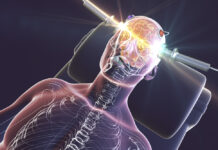This week on MIA Radio we turn our attention to electroconvulsive therapy (known as electroshock in the US). It’s fair to say that ECT remains a controversial subject with proponents and detractors regularly disagreeing on its safety and efficacy. The number of psychiatrists willing to administer ECT, particularly in the UK, is in decline but we are still using it to administer electric shocks to the brains of an estimated 2,000 people each year.
In this interview, we discuss a recent paper from the journal Ethical Human Psychology and Psychiatry. The title is “Electroconvulsive Therapy for Depression: A Review of the Quality of ECT versus Sham ECT Trials and Meta-Analyses” and it is written by John Read, Irving Kirsch and Laura McGrath. On MIA we have previously written about the study and its findings.
We hear from two of the authors, Professor of Psychology John Read from the University of East London and Professor of Psychology Irving Kirsch from Harvard Medical School.
We discuss:
- That the work aimed to review the quality of meta-analyses and any relevant clinical studies of ECT.
- How there have only ever been 11 studies that have compared ECT with sham ECT (SECT).
- Sham ECT is when the anaesthetic is administered but not followed by shocks to the brain.
- That in addition to reviewing the quality of the studies, the paper went on to consider the effect of placebo in the administration of ECT.
- That when reviewing the quality of studies, a 24-point scale was used and that the scorers were blinded to each other’s ratings.
- The 24-point scale included 5 basic Cochrane Collaboration criteria and an additional 19 quality indicators, some of which were specific to ECT procedures.
- The average quality score across all the studies was 12.3 out of a 24 maximum.
- One of the most important findings was that none of the studies reviewed were double-blind.
- The reason for this is that the patients can’t be blinded to the procedure because the adverse after-effects are very obvious.
- In reviewing the studies it was sometimes the case that only the treating psychiatrist was rating the effectiveness of the procedure, not the patient.
- The 5 meta-analyses themselves only contained between 1 and 7 of the eleven available studies.
- The recommendation from the paper is that the use of ECT should be suspended pending a properly controlled, rigorous clinical trial.
- That the UK’s National Institute for Health and Clinical Excellence (NICE) has decided to review their ECT recommendations in their depression guidelines, considering the review.
- That the Royal College of Psychiatrists has indicated that they will update their ECT position statement in light of the review.
- It has come to light recently that NHS Trusts in the UK are sometimes using out of date or incorrect information in their ECT guidance leaflets, an example of this is referring to ECT correcting a ‘chemical imbalance in the brain’.
- How the expectations of the treating doctor can influence the condition of the person undergoing the treatment.
- That the placebo effect can be large and long-lasting and that the more invasive the procedure, the larger the effect.
- That one of the characteristics of depression is the feeling of hopelessness and that when you are given a new treatment, it can instil a sense of hope which counters the hopelessness.
- That the call to prohibit ECT is because the negative effects of ECT are so strong, the fact that the evidence supporting it is so weak (especially in the long-term and beyond the improvement due to placebo) and that there are other means of addressing the difficulties that the person is dealing with.
- That placebos are, in essence, a type of psychological therapy.
Links and further reading:
Richard P. Bentall: ECT is a classic failure of evidence-based medicine















Thank you very much James. And to John Read, Irving Kirsch
“In reviewing the studies it was sometimes the case that only the treating psychiatrist was rating the effectiveness of the procedure, not the patient.”
We cannot depend on the ratings of those who distort the “customer’s” original and post treatment narratives.
Of course people will be hopeful if a doctor tries to fix the “illness” that the doctor found to be at the base of their hopelessness. That would be a temporary hopefulness…(perhaps a desperation that the doctor mistakes for hope)…. then dashed, to be felt stronger when people realize that it was not an illness, nor a doctor or treatment, nor their story.
Report comment
Thank You, John and Irving and James
You are part of a group of ethical professionals and activists that are patiently and successfully turning the tables on very bad behaviour in “Mental Health”. The results of this in my opinion, can be clearly seen in the UK.
“…In reviewing the studies it was sometimes the case that only the treating psychiatrist was rating the effectiveness of the procedure, not the patient…”
– Which in the case of electric shock would be fairly “useless”.
Report comment
I was very glad to hear directly from these researchers, especially Dr. Kirsch. He thinks ECT should be banned, and of course most of us here certainly agree with that.
But he also made several other comments that should impact our understanding of how people with “subjective” conditions respond to “treatment.”
In particular he noted that while (psycho)therapy probably shouldn’t be reduced to the status of “placebo,” placebos obviously often function as therapies. If that doesn’t take the whole subject of subjective experience at least a bit out of the brain, I don’t know what does.
As I have expressed before – and I might mention that there is even a team of psychiatrists looking into this through the lens of past life recall in children – all evidence points to the fact that the mind is not the brain. Never should these two things be confused!
Report comment
Yeah, the placebo effect kind of refutes the “brain disease” concept all by itself. But most psychiatric researchers view it as an annoying impediment instead of real and meaningful data. If a third of your cases can resolve based on BELIEVING that they’re going to resolve, it sounds like there is something pretty powerful about believing things that affects the entire body and all its systems! But it’s hard to make money off of that kind of data, and it keeps making their drug trials look bad!
Report comment
ECT = Electro-Cution Torture
Get it right, people!….
Report comment